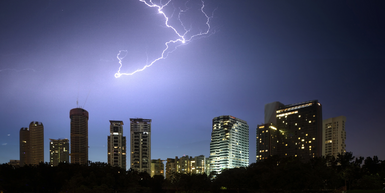Posted by Farco Plastics on 16th Sep 2023
Hurricane Window Protection:

Shielding Your Home with Plastic Materials
Hurricane season brings with it the daunting prospect of strong winds, flying debris, and torrential rains that can wreak havoc on homes and properties. During hurricane season, strong winds, flying debris, and heavy rains can cause extensive damage to homes and properties. In this comprehensive guide, we will delve into the world of plastic materials specifically designed for hurricane window protection. When it comes to protecting our homes and lives during the tumultuous storms that hurricanes bring, having the right materials in place can make a significant difference.
Understanding the Need for Hurricane Window Protection
Windows are often the most vulnerable points in a home's defense against hurricanes due to their destructive nature. The force of high winds can shatter windows and allow wind and rain to penetrate, causing extensive damage. Even the smallest projectiles can become deadly missiles. This is where plastic materials step in to provide a much-needed shield.
Choosing the right plastic material for hurricane window protection is crucial in ensuring the safety and security of our homes and loved ones during these tumultuous storms. High-impact polycarbonate, acrylic, and polyethylene film each offer their own advantages, catering to different needs and budgets.
Types of Plastic Window Protection
Polycarbonate Panels (Lexan or Makrolon)
One of the most used plastic materials for hurricane window protection is high-impact polycarbonate. This material is known for its exceptional strength and durability, making it an excellent choice for withstanding the powerful forces of hurricanes. High-impact polycarbonate is virtually unbreakable, and it can withstand flying debris, gusty winds, and intense pressure, providing a reliable barrier against the elements. Its lightweight nature also makes it easier to handle during installation and removal.
Acrylic Panels (Plexiglas)
Another popular plastic material used for hurricane window protection is acrylic. Acrylic, often referred to as plexiglass, shares some similarities with polycarbonate but offers its own unique benefits. While not as impact resistant as polycarbonate, acrylic still provides a formidable shield against hurricane forces.
It is known for its excellent clarity, allowing for unobstructed views even when windows are protected. Acrylic is also resistant to UV radiation, preventing yellowing or discoloration over time. Its scratch-resistant surface ensures that the protective barrier remains clear and effective for years to come.
Impact-Resistant Film
Impact-resistant window films, while not resembling solid plastic barriers, serve as crucial components of hurricane protection strategies. These specialized adhesive films are meticulously applied to the glass surfaces of buildings, offering an additional layer of defense against the destructive forces of hurricanes and high winds.
By adhering tightly to the glass, these films reinforce its structural integrity, effectively minimizing the risk of shattering during extreme weather events. They act as a resilient shield, safeguarding not only the property but also the occupants inside. The benefits of impact-resistant window films extend beyond their standalone effectiveness, as they are often integrated with other hurricane protection measures, such as hurricane shutters or reinforced building designs.
Choosing the Right Hurricane Window Protection
The choice of hurricane window protection depends on various factors, including budget, aesthetics, ease of installation, and the specific requirements of your home. Local building codes and regulations may also dictate which hurricane protection options are acceptable. Ensure you make an informed decision to safeguard your home effectively.
Alternative Window Protection
- Storm shutters, despite not being constructed entirely of plastic, are fundamental tools for safeguarding against hurricanes. Typically crafted from durable materials like aluminum or steel, some storm shutter designs do incorporate plastic elements for added versatility and functionality. These shutters serve a crucial role by completely concealing windows, establishing a formidable defense against flying debris and the ferocious forces of extreme weather conditions.
- Accordion shutters, predominantly composed of aluminum while occasionally featuring plastic components, offer a convenient solution for hurricane protection. These shutters expand horizontally to effectively cover both windows and doors, ensuring comprehensive coverage and security during turbulent weather events. Their adaptable design allows for straightforward deployment, making them a practical choice for homeowners in hurricane-prone areas.
- Roll-up shutters, characterized by their horizontal slats, provide a swift and efficient method to shield windows from the ravages of high winds, airborne projectiles, and heavy rainfall. Although primarily constructed from materials like aluminum, some roll-up shutter models incorporate plastic components to enhance their durability and ease of use.
The versatility of these storm shutter options, whether they incorporate plastic elements or not, underscores their significance in fortifying homes and businesses against the destructive forces of hurricanes. In regions susceptible to such weather events, the combination of impact-resistant window films, storm shutters, accordion shutters, and roll-up shutters forms a comprehensive defense strategy, safeguarding property and lives during hurricane threats.
Conclusion
In the face of the destructive forces that hurricanes unleash, plastic materials have emerged as faithful defenders of homes and lives. Polycarbonate and acrylic panels, storm shutters, impact-resistant film, hurricane fabric screens, accordion shutters, and roll-up shutters offer a range of options to suit your needs. By selecting the right hurricane window protection, you can fortify your home against the fury of nature and ensure the safety and security of your loved ones.

